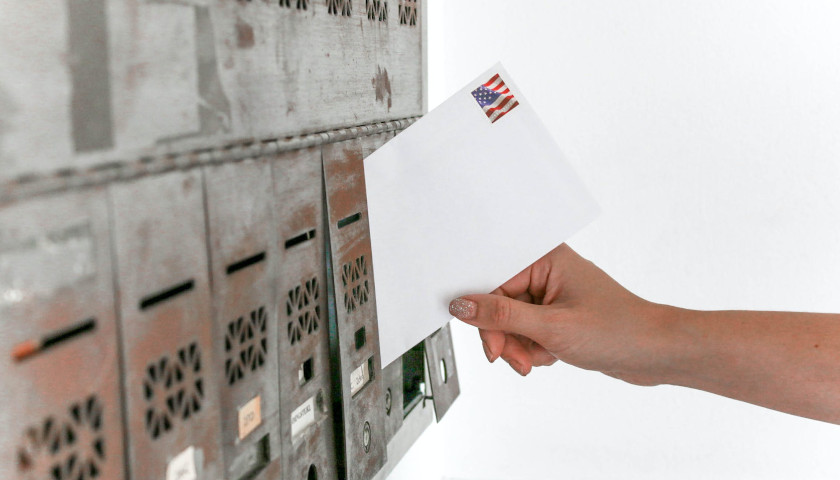Jury roll data in one county suggests around 10 percent of registered Virginia voters may be ineligible to vote, according to a white paper written by a voter integrity watchdog group called the National Election Integrity Task Force (NEITF).
“I’m not surprised by it at all,” Heritage Foundation Senior Legal Fellow Hans Von Spakovsky told The Virginia Star in an exclusive interview about the NEITF white paper, which was first reported about in the Washington Free Beacon.
Von Spakovsky served three years on the electoral board in Fairfax County, which neighbors Prince William County. While there, he requested a comparison of the electoral board’s records with the Virginia Department of Motor Vehicles (DMV). “They found almost 300 individuals that were registered to vote in Fairfax County, yet when they went to get their driver’s license, they presented documents indicating that they were not U.S. citizens,” he said.
As a member of the electoral board, Von Spakovsky took them off the voter rolls – but he said close to half of them had already voted in Virginia elections.
The NEITF’s claim stems from a 2019 report by the Prince William County’s circuit court that found that 2.7 percent of potential jurors summoned were non-citizens. John Mills, the NEITF spokesman, said that’s a problem by itself. “[T]he Virginia court system guidance [is] predominantly pulled from registered voter databases.”
According to Mills, at the time of his inquiry, Prince William officials told him there were no other sources for the jury data. Currently, the Prince William Circuit Court website states that once each year its list of prospective jurors is pulled from both voter registration lists and DMV lists.
Although Mills declined to make the white paper public, Public Interest Legal Foundation President J. Christian Adams agrees that there is a problem with ineligible people being registered voters. Adams said the existence of non-citizens on juror rolls suggests problems with either voter databases or jury recusal forms.
Some jurors may claim to be non-citizens to dodge their legal jury duty requirement. “They have to say under oath, ‘I don’t want to do jury duty because I’m not a citizen,’ and they have to say under oath when they register to vote that they are a citizen.” Adams said, adding, “I told you I’ve seen the jury recusal forms, there’s a problem there.”
Von Spakovsky wants to see laws forcing county clerks to automatically send jury recusal data to elections officials, which would help identify both people voting illegally and people dodging jury duty.
Mills is also troubled by other categories of disqualified jurors. In addition to the 2.7 percent of non-citizens, undeliverable summons (5.9 percent), non-English speakers (1.8 percent) and felons (.9 percent) total 11.3 percent of the county’s voters, which Mills says could be fraudulent and similar patterns could hold true across much of Virginia. However, Adams said it is lawful for a non-English speaker to vote, and pointed to section 203 of the Voting Rights Act, which requires ballots to be available in other languages.
But extrapolating from one Virginia county’s jury rolls might not accurately represent the whole state, according to Weldon Cooper Center for Public Service Demographer Hamilton Lombard. Lombard added that for a given weakness, “some counties may be more susceptible to voter fraud than others, based on their characteristics. In the case of Prince William, at least a quarter of its population is foreign born, double Virginia’s rate of 12.5 percent. So the analysis of its jury pools was more likely to find non-citizens in the pool than in most other Virginia counties.”
Director of Community Relations at the Virginia Department of Elections (ELECT) Andrea Gaines told The Star in an email, “Virginia is often recognized for its strong list maintenance programs. The Joint Legislative Audit Review Commission’s (JLARC) September 2018 report on ELECT gave positive reviews of our list maintenance program as well as the Election Assistance Commission.”
JLARC conducts reviews of various state programs for the General Assembly. Their report on ELECT summarized, “Virginia uses a fairly robust process to maintain its voter registration list, but can further improve process and guidance.”
ELECT audits its voter lists yearly, and the 2019 report lists the processes they use to remove non-eligible voters, including comparing their database with the USPS National Change of Address registry. ELECT mails a forwardable mailer to the original address, and if the voter does not respond within 30 days, the voter is placed on an ‘Inactive List.’ Inactive voters can still vote, but the law requires extra documentation and a signature saying they are a qualified voter at their address.
ELECT also works with a national database of 27 states and Washington D.C. to identify voters registered in multiple states. North Carolina and Tennessee do not participate in the database, making it difficult to identify Virginia voters who are also registered in either state. ELECT mails confirmation mailers to the Virginia addresses of voters registered in multiple states, and sends cancellation mailers to their out-of-state address. The Virginia State Police Central Criminal Record Exchange sends monthly updates and an annual list of felony records to ELECT. The DMV also periodically sends lists of individuals who self-identify as non citizens to ELECT.
However Adams said faulty DMV data is a major way non-citizens accidentally end up on voter rolls. He pointed to glitches in other states like Pennsylvania, which had an error in their DMV system that allowed some non-citizens to register to vote, according to the Washington Times.
“I’ve seen plenty, plenty, of voter registration forms where the individual marks ‘No’ to the question ‘Are you a U.S. citizen?’ They check the box ‘No’ and they still get registered. I’ve held scores of them in my hands,” Adams said.
– – –
Eric Burk is a reporter at The Virginia Star and the Star News Digital Network. Email tips to [email protected].





I wrote the city registrar this article. No great response yet, just covering his fanny.